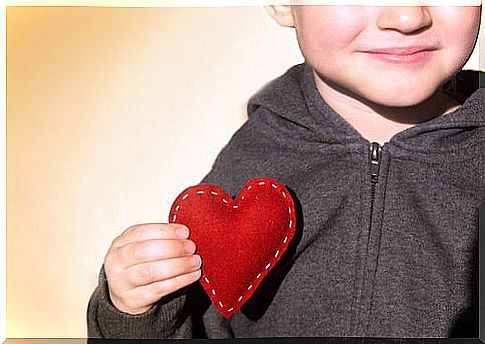Why Is Unconditional Love So Important For Our Children?

When we are asked who is the person who has made us feel most loved, the most common answers are usually parents or in some cases grandparents. Why? What is special about that love that they give us and that makes us feel so loved?
The key is unconditional. In that sincere and unconditional way of loving, which does not understand perfection, expectations or mistakes, but acceptance. Hence the importance of unconditional love for our children. Let’s go deeper.

Love without conditions
In addition, you will become an adult with good self-esteem and will have a better chance of establishing satisfactory relationships with others.
As we can see, this type of love confers stability, a feeling of protection and security, necessary ingredients to feel good both with ourselves and with others.
Signs of unconditional love for our children
Sometimes we are sure to love our children unconditionally, but … do they know? Are we capable of transmitting it properly? The reality is that sometimes they may perceive it differently. Therefore, it is important to make sure of how they feel.
In addition, so that our people feel unconditionally loved by us, the following recommendations can help us:
- Tell children how much you love them, not just when they do things right.
- Do not compare them to siblings, friends, or cousins. It is important to let our children know that we accept and love them as they are, with their virtues and their aspects of improvement, but that these aspects do not influence our love for them.
- Spend time with them. Spending quality time with our children is very important. Sometimes work schedules don’t allow us to spend as much time as we want and we think “am I spending the time I have with them well?”. Simply by asking him about his feelings, taking his thoughts seriously and trying to put ourselves in his place, we will be fostering the bond of attachment. Another wonderful way to spend time with them is by looking for a common hobby: a sport, cinema, painting… something that we are really passionate about, and that we enjoy doing together.
- Communication. When we scold our children, many times we don’t explain why, we tell them “don’t get on there”, “don’t touch that”, “don’t do that”… It is important to explain the reason why they are being scold, in addition to be firm with our orders, without devaluing them if they make mistakes and encouraging them to improve.
- Clearly distinguish the person’s behavior. The child may behave badly, but he is not bad. You may be scared, but that doesn’t mean you’re scared… Very important: watch out for labels.
- Do not confuse love with overprotection. Loving a child does not mean approving of everything he does, or having the need to save him trouble. It is always better to help you find solutions and let you act, keeping us by your side, but as support if you need it.

Finally, we must not forget that unconditional love is closely linked to care. No matter how affectionate and open to dialogue we show our children, if we do not cover their basic needs for care, food, cleanliness, and studies, among others, that unconditional love will not exist.









